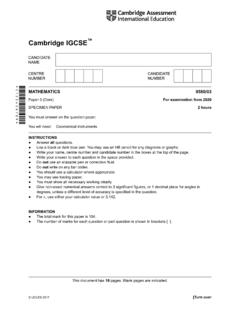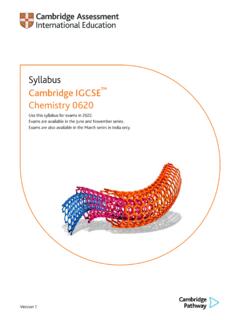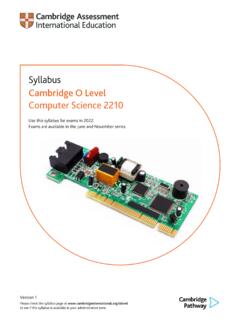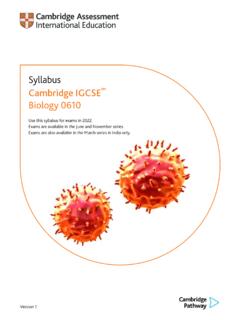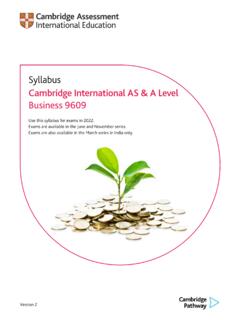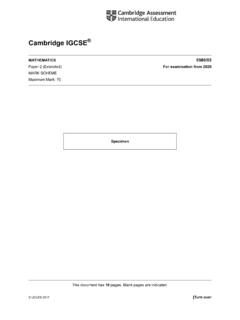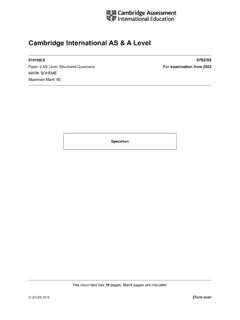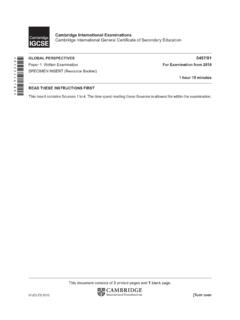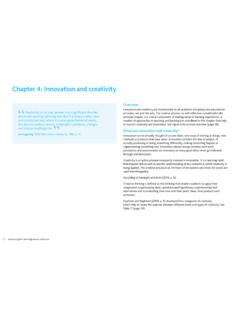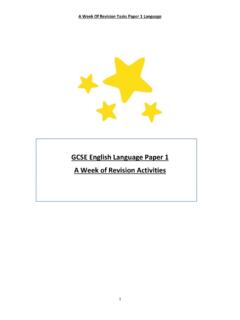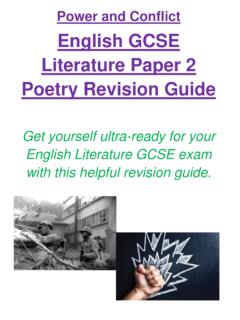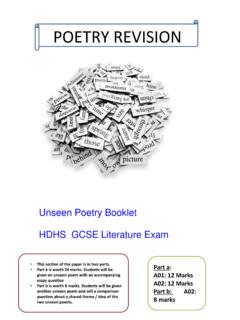Transcription of First Language English 0990
1 Learner GuideCambridge IGCSE (9 1) First Language English 0990 For examination from 2020 InteractiveVersion 1 Learner Guide2In order to help us develop the highest quality resources, we are undertaking a continuous programme of review; not only to measure the success of our resources but also to highlight areas for improvement and to identify new development invite you to complete our survey by visiting the website below. Your comments on the quality and relevance of our resources are very important to IGCSE is a registered trademarkCopyright UCLES 2018 Cambridge Assessment International Education is part of the Cambridge Assessment Group. Cambridge Assessment is the brand name of the University of Cambridge Local Examinations Syndicate (UCLES), which itself is a department of the University of retains the copyright on all its publications.
2 Registered Centres are permitted to copy material from this booklet for their own internal use. However, we cannot give permission to Centres to photocopy any material that is acknowledged to a third party, even for internal use within a you like to become a Cambridge consultant and help us develop support materials?Please follow the link below to register your Guide3 ContentsSection 1: About this guide 4 Section 2: Syllabus content skills and understanding 5 Section 3: How you will be assessed 6 Section 4: What skills will be assessed 10 Section 5: Example candidate response 11 Section 6: Revision 19 Section 7: Useful websites 33 Learner Guide4 Section 1: About this guideThis learner guide explains what you need to know about your Cambridge IGCSE (9 1) First Language English will help you to understand.
3 9the skills you should develop by taking this Cambridge IGCSE (9 1) course 9how you will be assessed 9what examiners are looking for in the answers you write 9how you can revise effectively, using our revision tips and interactive revision checklist (Section 6).You can use this guide to help you during your Cambridge IGCSE (9 1) First Language English course, but remember that it is important to read widely both for your own enjoyment and to increase your awareness of the different ways in which English can be used. Try to read different types of text, such as short stories, novels, newspaper reports, magazine articles, travel writing, autobiographies and a wide range of texts will help to inform and inspire your writing, and help to increase your understanding of how to write for different purposes and your skills in reading and writing, you also need to develop your speaking and listening skills, by engaging in IGCSE (9 1) qualifications are accepted and valued by leading universities and employers around the world as evidence of academic achievement.
4 Following the Cambridge IGCSE (9 1) First Language English course will help you to understand the subject and develop the skills you need for your next step in education or employment. This guide provides ideas and information to help you make the most of the opportunities your Cambridge IGCSE (9 1) course offers to become an appreciative and critical reader, writer, speaker and listener of Guide5 Section 2: Syllabus content skills and understandingDuring your Cambridge IGCSE (9 1) First Language English course you will need to: develop your ability to communicate clearly, accurately and effectively when speaking and writing learn how to use a wide range of vocabulary, and the correct grammar, spelling and punctuation develop your personal style of writing and speaking, as well as your awareness of the audience you are can think of your Cambridge IGCSE (9 1) First Language English course as having three main areas of skills and understanding: Reading Writing Speaking and is an outline of the skills you should aim to have developed by the end of your need to be able to.
5 R1 demonstrate understanding of explicit meaningsR2 demonstrate understanding of implicit meanings and attitudesR3 analyse, evaluate and develop facts, ideas and opinions, using appropriate support from the textR4 demonstrate understanding of how writers achieve effects and influence readersR5 select and use information for specific need to be able to:W1 articulate experience and express what is thought, felt and imaginedW2 organise and structure ideas and opinions for deliberate effectW3 use a range of vocabulary and sentence structures appropriate to contextW4 use register appropriate to contextW5 make accurate use of spelling, punctuation and and listeningYou need to be able to.
6 SL1 articulate experience and express what is thought, felt and imaginedSL2 present facts, ideas and opinions in a cohesive order which sustains the audience s interestSL3 communicate clearly and purposefully using fluent languageSL4 use register appropriate to contextSL5 listen and respond appropriately in skills are sometimes called assessment objectives as they are the skills you will want to show you have when they are tested at the end of your Guide6 Section 3: How you will be assessedThere are four components available in the Cambridge IGCSE (9 1) First Language English course. You will take either two or three components in total. Find out from your teacher which components you will be taking, and when you will be taking the end of your course, your reading and writing skills will be assessed for your final grade for Cambridge IGCSE (9 1) First Language English .
7 There are two different options for how this can oneYou will take two 1 ReadingPaper 2 Directed Writing and CompositionANDORO ption twoYou will take one examination and submit a coursework portfolio of written assignments completed during your 1 ReadingComponent 3 Coursework PortfolioANDThe same reading and writing skills will be tested in both options, and you will be able to access the full range of grades for the Cambridge IGCSE (9 1) qualification. There is also an extra option for assessing your speaking and listening skills:Component 4 Speaking and Listening TestMarks for speaking and listening do not contribute to the overall grade you receive for the reading and writing components.
8 Instead, where you perform to an appropriate standard, your Cambridge IGCSE (9 1) certificate will also record an additional speaking and listening Guide7 Components at a glanceThe table below gives you further information about each of the and marksSkills assessedDetailsPercentage of qualificationPaper 1 Reading Passages (compulsory)2 hour examination80 marksReading (65 marks)Writing (15 marks)Read three texts in the examination and answer three 2 Directed Writing and Composition (alternative to Component 3)2 hour examination80 marksWriting (65 marks)Reading (15 marks)Read one or two texts in the examination and answer two 3 Coursework Portfolio (alternative to Paper 2)Completed during your course80 marksWriting (65 marks)Reading (15 marks)Complete three written of these is a response to one or two 4 Speaking and Listening Test (optional)Additional test 10 12 minutes total40 marksCompleted before your written examination(s)Speaking (30 marks)Listening (10 marks)You will talk for about 3 4 minutes on a single topic or theme.
9 This individual talk leads into a conversation about your chosen topic or endorsedRemember: you must take Paper 1 you take either Paper 2 or Component 3 Component 4 does not contribute to your overall result, and is marked as a separate examination, for which you will be given a separate Guide8 About each componentBelow are further details about each 1 MarksQuestionsReading2 hour examinationYou will answer three compulsory questions on three texts (A, B, C).The texts will be printed on the question paper insert and may be on a similar should spend about 15 minutes reading the texts, leaving approximately 30 35 minutes to respond to each question. 30 Question 1 is based on Text A and Text B (The total length of Text A and B combined will be 700 750 words) This question is divided into separate parts: Comprehension task (based on Text A)You respond to a series of sub-questions.
10 These sub-questions test your understanding of both explicit and implicit meanings and your ability to select/use information from the text. 15 marks are available for reading Summary task (based on Text B)You answer a selective summary task using your own words. Your summary must be written as continuous writing of no more than 120 words. 10 marks are available for reading, 5 marks for writing25 Question 2 is based on Text C (500 650 words). This question is divided into two separate parts: Short-answer questionsYou respond to a series of sub-questions which require answers of different lengths. These sub-questions test your understanding of the meaning of words and phrases used in Text C, as well as the effect they have on the reader.
